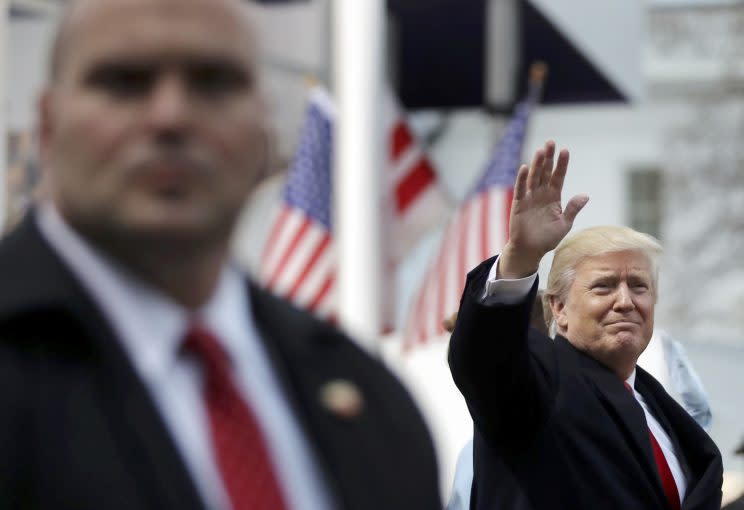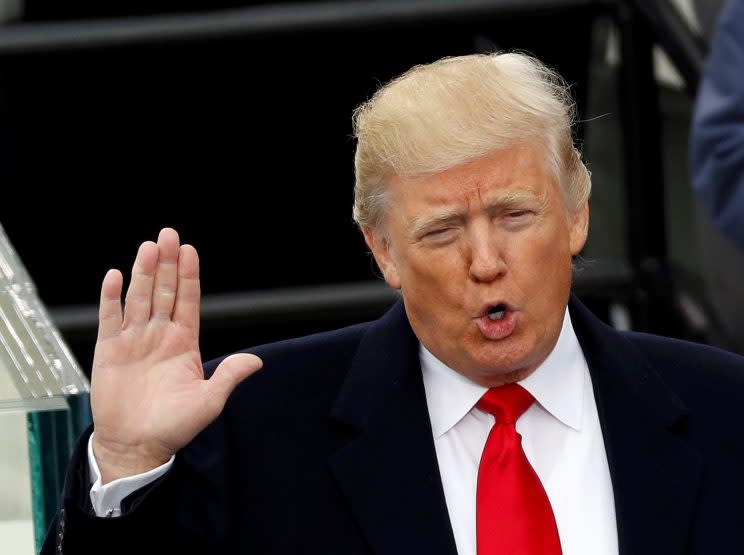In Trump’s inaugural speech, a demand for unity and loyalty
President Trump’s talk of unity in his inaugural address sounded less like an appeal and more like an imperative, maybe even a command.
“At the bedrock of our politics will be a total allegiance to the United States of America, and through our loyalty to our country, we will rediscover our loyalty to each other. When you open your heart to patriotism, there is no room for prejudice,” Trump said.
It’s laudable any time a leader seeks to make an argument for bringing people together, and America certainly needs to hear such sentiments. But as a predictor for how effective Trump will be in continuing to lay out such a vision, his remarks on the topic were lacking.
Even in Ronald Reagan’s first inaugural address in 1981, which was reportedly one of the few speeches Trump consulted as he crafted his own, the former Republican president touched on themes of overcoming hate and division that were pointedly missing from Trump’s address.
“We shall reflect the compassion that is so much a part of your makeup,” Reagan told the nation. “How can we love our country and not love our countrymen, and loving them, reach out a hand when they fall, heal them when they are sick, and provide opportunities to make them self-sufficient so they will be equal in fact and not just in theory?”
There was an echo of this in Trump’s argument that loyalty to country will produce loyalty to countrymen. But Reagan also heavily emphasized compassion and love, elements largely missing from Trump’s speech.

Trump’s logic was that love of country can overcome division. But that is an ahistorical statement. Patriotism has often fueled, rather than suppressed xenophobia, racism and systemic oppression of minorities.
If Trump displayed more interest in the principles of the U.S. Constitution — that the rights of men come from God and not from government, respect for the rule of law, checks and balances, a balance between the will of the people and the moderating influence of government institutions — there might be less concern about his absolutist talk of “total allegiance” to the country he now leads and represents.
Before his speech, Trump raised his right hand and promised to “protect and defend the Constitution of the United States.” But as he spoke moments later, Trump told the crowd that he had taken “an oath of allegiance to all Americans.”
And the fuel of Trump’s candidacy was anger against a roster of villains including Muslims, Mexicans, the media and so on. His candidacy drew the support of white nationalists who — encouraged by Trump’s years-long promotion of the theory that the nation’s first black president was not an authentic American — saw in him a sympathetic figure.
There has been a strong undercurrent in Trump’s support that white Americans — who make up the overwhelming majority of his supporters — have lost cultural and political power over the last few decades at the expense of gains by minorities and immigrants. These are not entirely baseless fears. Numerically, white Americans are certainly not the overwhelming majority they used to be, and they will continue to decline as the dominant group.
Yet whatever Trump might have done in the past to encourage this by winks and nods, many hoped he would strike a more inclusive note and appeal to something even higher and deeper than country — to the common humanity of each American. His speech did not do this.

The case for Trump is that he encouraged Americans of all races, colors and creeds to recognize their common citizenship. But prejudice has been overcome by individuals recognizing the inherent dignity of every human, an idea grounded in the three Abrahamic faiths: Judaism, Christianity and Islam. Additionally, a healthy dose of humility has helped, produced by a clear-eyed recognition of one’s own imperfection.
But Trump is not known for his humility. And his grandiose rhetoric — “I will never ever let you down,” an echo of “I alone can fix it” from his convention speech — suggests Trump envisions a much bigger role for himself in the life and imagination of the average American.
The phrase “total allegiance” was of a piece with other parts of Trump’s speech that sounded more like the words of a monarch than of a democratically elected president — notably one who received almost 3 million fewer votes than Democrat Hillary Clinton. Trump said he would make Americans “the rulers” of their own country, and spoke of issuing “a new decree.”
And the idea of “total allegiance” shaped the words Trump said moments later: “We must speak our minds openly, debate our disagreements honestly, but always pursue solidarity.” In other words, some disagreement is fine, but then fall into line.
One of Trump’s first acts as president was to sign a formal proclamation announcing a national day of patriotism. In one sense, this was in line with the main theme of his speech: “From this day forward, it’s going to be only America first, America first.”
But Trump’s talk of unity through patriotism showed the limits of his own thinking and is ultimately a weak foundation on which to try to rebuild the country, if that is indeed his goal.
_____
Read more from Yahoo News:
Trump team defends lack of diversity in Cabinet picks



